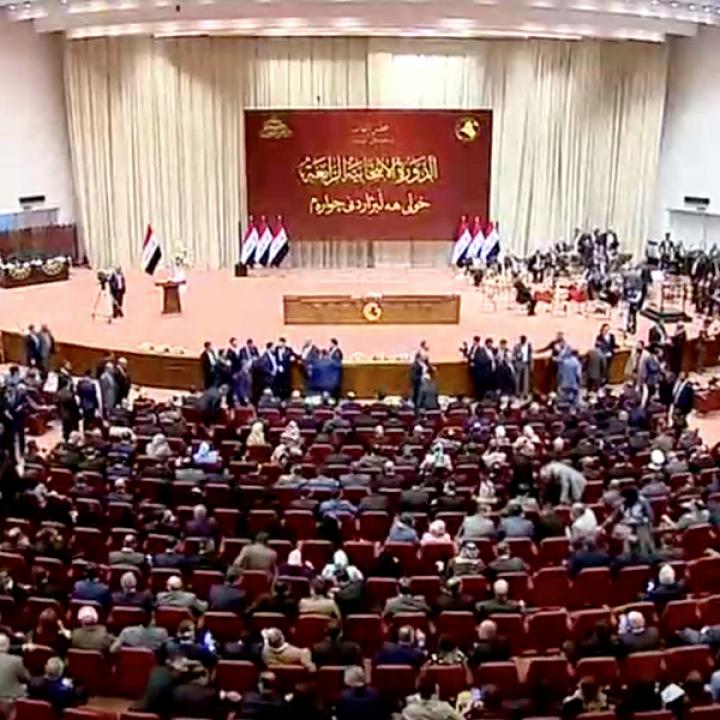
- Policy Analysis
- Fikra Forum
Iraqi Early Elections May Not Be a Game Changer

While Iraqi elites seem to see the announcement of early elections as a major development, polling reveals that Iraqi public opinion is less optimistic about the moves ability to promise major change.
There is a widespread belief among Iraqi elites that the upcoming elections in Iraq are pivotal and will lead to a major change in the map of the political forces controlling the Iraqi scene since 2003. This conviction was strengthened after Prime Minster Mustafa al-Kadhimi announced his proposal to hold parliamentary elections early, on June 6, 2021. The hope for real change also increased after the amendment of the Iraqi election law and the appointment of a new independent election commission consisting of independent judges. These changes in circumstances led me to look to see if they have produced correspondingly more optimistic views in Iraqi public opinion during the past three months about the nature of Iraqi politics.
Though I was hoping that these electoral institutional changes would yield more optimistic expectations in the Iraqi public regarding Iraqi politics, the results of my polls should greatly reduce expectations that the current excitement over changed election rules will filter down to the average Iraqi. The gap between what elites think about these electoral changes and public opinion demonstrates once again a wide disparity between what the elites expect and what the Iraqi people think generally.
Two of these surveys were conducted using a nationwide probability random sample of 2,000 and 3,000 Iraqi respondents respectively with computer assisted personal interviews (CAPI). The third survey was conducted using computer-assisted telephone interviews (CATI) on a simple random sample of 1,300 interviews.
It is clear that the first condition for achieving real change in the Iraqi political scene that has dominated the parliament and government since 2003 is a voter turnout in the upcoming elections that exceeds turnout during the 2014 and 2018 elections. It is well-known that the prevailing forces controlling parliament have a solid base that will come out to vote for them in all cases, no matter how small the size of that base. Therefore, the lower the rate of participation in the elections, the greater the chances of these parties doing well, since their voters will always show up to vote.
Unfortunately, the expected rate of participation in the upcoming elections does not seem encouraging. According to these polls, voter participation will not exceed 35-40% of eligible voters. The absolute majority, representing more than two-thirds of those boycotting the vote, are young people between 18-35 years old.
Encouraging Iraqis, particularly young Iraqis, to participate in the upcoming elections is good for bringing about a change in the political scene, and it is vitally important in order to prevent a slip towards violence and instability. For people to participate, however, they must be confident enough in the integrity of the elections, and they must trust that their votes will not be rigged or hijacked. Generally, they must believe that their votes will lead to the change they want, rather than another round of disappointment.
Poll figures indicate that more than 60% of Iraqis in general (and in some areas much higher) do not trust the integrity of the elections. Less than 30% trust the Independent High Electoral Commission. Moreover, less than 15% of Iraqis believe that their vote in the upcoming elections will lead to a change in the political scene.
These results confirm that the upcoming elections—if they take place under the current circumstances without adjusting the factors that affect the beliefs of the Iraqi public—will not bring the changes that many Iraqis hope for. This is particularly true for those who have gone to the streets since October 2019 to demonstrate for political change.
To make matters worse, there is a lack of trust in Iraqi state institutions. Despite a tangible improvement in the level of Iraqi satisfaction with these institutions and the new prime minister, who enjoys significant support in the public, more than 55% of Iraqis still do not trust the government. More than half of Iraqis also do not trust the judiciary system, while no more than 15% trust the Iraqi parliament. No more than 10% of Iraqis trust political parties, and only 2% of Iraqi youth belong to those parties.
The Iraqi people's lack of trust in Iraqi state institutions—along with a widespread belief in the existence of a so-called ghost state or deep state that controls the formal state—has made many Iraqis, especially young people, prefer change outside the institutional framework. The Iraqi understanding of the deep state is that militias allied with Iran have a stranglehold on Iraqi political decision-makers. Even if there are changes to the political party power structure, the deep state will endure, and the critical nature of Iraqi politics will not change.
This viewpoint is a major factor in the sense of hopelessness among Iraqi youth. It helps fuel their deep feeling of marginalization, lack of confidence in political institutions, and need to be heard that made the October 2019 uprising in Baghdad and southern Iraq the longest and most influential since the establishment of the Iraqi state in 1921.
Unless the institutions of the Iraqi state are able to accommodate and attract these young people, violence will be the only alternative to the crippling of the democracy that the United States tried to install in Iraq after 2003. The only peaceful way to avoid a scenario of violence and chaos in Iraq now is for the Iraqi government and the international community to provide Iraqi youth with real and convincing guarantees that the upcoming elections will be characterized by integrity and transparency in a departure from how they have been in the past. But with elections coming in less than a year, the window available for real work to be done appears to be gradually closing.





